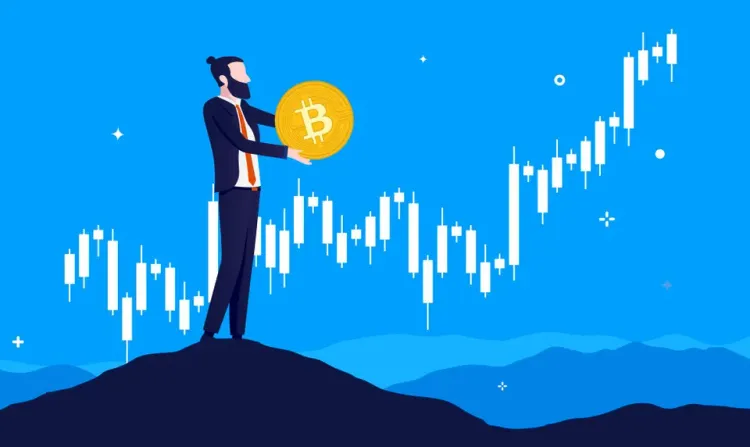Banks, Investment Firms as the New 'Bitcoin Whales'

Are ETFs the new Bitcoin whales?
It's been an exciting month for Bitcoin and crypto enthusiasts. On Wednesday, the price of Bitcoin (BTC) topped $60,000 for the first time since November 2021. Bitcoin's market value has been on a steady upward movement since September last year.
Ethereum (ETH), the second biggest crypto in terms of market volume, is also on the move. Its price consolidated above $3,390 after hitting its peak of $3,525 on February 29th. Although there were dips in its price in the last few days, it can't be denied that the attention and excitement surrounding the premier cryptocurrency are back.
So why is Bitcoin going up?
One reason for the community's bullish sentiment on Bitcoin and cryptos comes from investor optimism on Bitcoin Exchange-Traded Funds or ETFs.
Last January 10th, 2024, the Securities and Exchange Commission (SEC) released a statement approving the listing and trading of several spot bitcoin exchange-traded product (ETP) shares. In the same statement, the SEC announced that it had approved 11 applications, including those from BlackRock, Ark Investments/21Shares, and Fidelity.
While there were few warnings, the SEC's move was seen as a watershed moment for Bitcoin and the greater cryptocurrency market. Trading of these products immediately followed after the announcement, signaling the start of fierce competition for market dominance.
The introduction of ETFs is considered a 'game-changer' for Bitcoin and crypto in general, as it provides retail investors with exposure to crypto without directly holding it. In addition, it's a boost for the institutionalization of Bitcoin (and altcoins) as an asset class. Also, it gives rise to new active players now dominating the market—a new kind of Bitcoin whale.
Banks and investment firms lead in buying and trading Bitcoin
After the SEC approved the ETFs, especially spot Bitcoin ETFs, major banks and investment firms lost no time participating in the market. Pre-approval, Bitcoin has been trading below $50,000, jumping to over $60,000 at the time of approval, until today.
Then there's the market volume, as more traders took part in the market, including the aggressive campaigns of investment firms into spot Bitcoin ETFs. Last February 27th, more than $577 million flowed into the spot Bitcoin ETFs, thanks to investment firms' participation. Firms like BlackRock, Grayscale, and Fidelity are investing billions into buying this digital asset, and they have become today's 'Bitcoin whales.'

But first, let's define a Bitcoin whale and its role in the industry.
Bitcoin whales are individuals or organizations holding large amounts of BTC and altcoins and can significantly affect the price action of digital currency in a single trade. Enthusiasts and crypto watchers say that the minimum threshold for a BTC whale is 1,000 BTC, while others say that the limit is 10,000 coins. This term is a colloquial phrase to illustrate the size of their holdings relative to that of the other market participants or the 'smaller fishes' in the industry.
In the past few years, the whales or those with a huge stack of coins are the crypto exchanges, software companies such as MicroStrategy, crypto and other private companies, and high-profile individuals and investors like Michael Saylor, Time Draper, and the Winklevoss twins.
Thanks to the approval of spot BTC ETFs and the recent surge in market price, we can add another group to the list: banks and investment firms.
BlackRock, Fidelity, and Grayscale as top investment firms
Three leading investment firms dominating the Bitcoin spot ETF market are Grayscale, BlackRock, and Fidelity.
Grayscale is the most established among these three players, starting earlier than others. Grayscale's $27 bn Bitcoin trust, which was transformed into an ETF, was one of the first ones approved by the SEC, and it's the first publicly traded spot ETF in the market.
Based on recent news articles, Grayscale retains its 1.5% fee, whereas others charge fees ranging from 0.2% to 0.9%. Grayscale has a competitive advantage thanks to its size, with over $27 billion in management assets. The company seems to be counting on experience and the headstart, while other firms are 'starting from scratch'.
However, Grayscale's aggressive approach has failed in the last few weeks, with the surge of demand interest in other firms, particularly BlackRock and Fidelity. BlackRock and Fidelity charge 0.12% and 0.25%, respectively, while Cathie Wood's Ark Investment will charge 0.21%. For retail investors looking to bite into an attractive market without the pain, it pays to find firms with lower fees.
One only needs to check the inflows and market action to see how these investment firms perform relative to their peers.
Last Wednesday, February 28th, the BlackRock exchange-traded fund (ETF) netted record inflows of $520.2 million, the largest daily intake for any US-based ETF across asset classes this year. The inflow into BlackRock's ETF happened when the BTC price was testing $64k, and there was a market frenzy and noise on social media.
Next to BlackRock is Fidelity, another important player in the market, which raked in $126 million on the same day. On the other hand, Grayscale continued to bleed on this day, with $125 million in outflows.
As things stand, BlackRock and Fidelity will dominate the market for the next few months. Amid the ongoing news and hype on this new investment product and BTC price rally, BlackRock's Spot Bitcoin ETF is now one of the biggest in the market and officially a new kind of Bitcoin whale, with over $10 billion worth of BTC under management.
Together with Grayscale, BlackRock has led the initial 11 approved ETFs, reaching the milestone just seven weeks after its launch. In addition, the company is now the fastest ETF to reach the $10 billion milestone in assets under management. In a way, it also helped spur the demand and excitement for Bitcoin in recent weeks, pushing the crypto to the $62,000 level.
Bitcoin is now more accessible
Experts and industry watchers say that the SEC's approval of Bitcoin ETFs last January has expanded the reach of the market. There are now fresh investments from other players like wealth managers, investment firms, and retail traders who were formally not into Bitcoin trading. Thanks to the convenience and ease of trading BTC through ETFs, there are more interested investors and traders, helping drive demand and its price.
In a way, the approval of BTC ETFs lends another layer of credibility to Bitcoin and cryptocurrencies. The SEC's approval has transformed the digital coin into an 'investable asset class,' safer and easily accessible. With ETFs, small retail investors now have the chance to invest in this asset class without spending a fortune.
As the industry's attention turns to Bitcoin halving in the next few months, investors, including retail traders, are seeing more potential in the asset class. While we're waiting for that to happen, we expect our new Bitcoin whales to fight for market share and relevance in this highly competitive and erratic industry.




